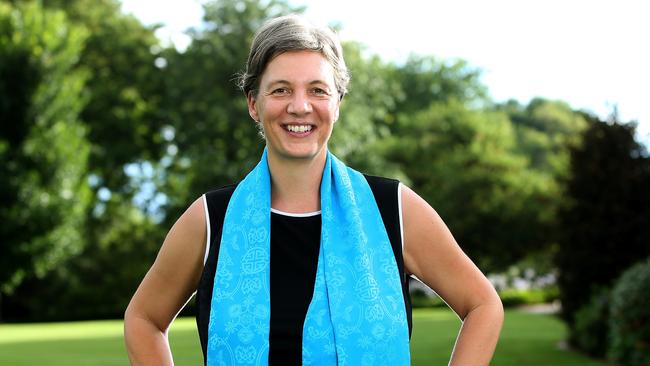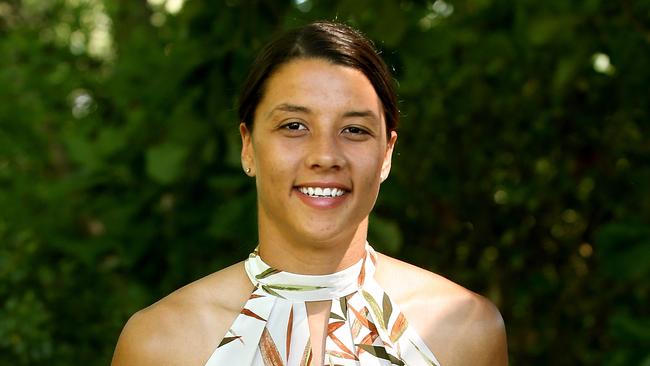Australian of the Year Michelle Simmons: quantum leap for women in science
Quantum physics professor Michelle Simmons has been named Australian of the Year for her world-leading research.

Quantum physics professor Michelle Simmons — a British migrant and champion for women in science — has been named Australian of the Year for her world-leading research in the “space race of the computing era”.
Professor Simmons, who works at the University of NSW, was last night announced as the 2018 Australian of the Year for her pioneering research developing the world’s thinnest wire and creating the first transistor made from a single atom.
The 50-year-old, who aims to build a quantum computer powerful enough to solve complex problems in minutes, compared with thousands of years, has been billed as “one of the world’s top scientists”.
Professor Simmons, who accepted her award from Malcolm Turnbull at a Parliament House function last night, won the honour ahead of Queensland rugby league great Johnathan Thurston and Victorian actor Samuel Johnson.

Matildas soccer player Samantha Kerr, 24, won the Young Australian of the Year.
Biophysicist Graham Farquhar AO was awarded the Senior Australian of the Year and the 2018 Local Hero was awarded to Sydney mathematics teacher Eddie Woo, who has developed online lessons for more than 100,000 subscribers.
Professor Simmons, who travelled to Australia from Britain in 1999, said last night she wanted to build a quantum computer industry in Australia. “We are up against the likes of Google, IBM and Microsoft and if I lived in any other country in the world I would be worried,” she said.
Professor Simmons said, in physics, she was a woman in a man’s world. “Throughout my career I have found people often underestimate women scientists, and in some ways that is great because it has meant that I’ve flown under the radar and I’ve been able to get on with things,” she said.
“But I am also conscious that whenever someone starts to believe in what others think of them, that belief can become a self-fulfilling prophecy — and that’s one reason I feel it is important not to be defined by other people’s expectations of who you are or what you might be.
“I do believe women think differently, and diversity of thought is invaluable to technological and research development.”
Professor Simmons said she hoped her award would encourage more young women to explore science and quantum physics. Many young women stepped away from studying science after the age of 16, possibly because of societal misconceptions about the professions where women were more likely to succeed, she said.
Kerr said she viewed her award as an endorsement of the growing power of women’s professional sport. “As a female athlete, this makes me extremely proud to be Australian,” she said.
Professor Farquhar, an award-winning scientist who studies photosynthesis to address food security and climate change, said he would try to raise awareness of “innovative research”.
At last night’s event in the Great Hall, the Prime Minister said the nominees and winners showed Australia at its best.
“Whether through science or philanthropy, medicine or mentoring, their lives have made our lives better and they’re as diverse as the nation they represent,” Mr Turnbull said.
The Prime Minister will attend a citizenship ceremony in Canberra this morning before returning to Sydney. Bill Shorten will speak at a citizenship ceremony at the Brimbank City Council in western Melbourne.
This year’s honours list for the General Division of the Order of Australia included 426 male recipients and 215 female recipients, with 16 Australians awarded the Companion of the Order (AC); 72.5 per cent of all general division order of Australia nominations resulted in an award.
AC recipients included indigenous tennis champion Evonne Goolagong-Cawley and Olympic legend Betty Cuthbert (posthumously). Human rights barrister Geoffrey Robertson QC was awarded an Officer of the Order of Australia, and Royal Australian Navy Vice-Admiral David Johnston received an Order of Australia as an Officer in the Military Division, in recognition of his 40-year defence career.
A further 254 Australians were recognised through meritorious and military awards.
Governor-General Peter Cosgrove congratulated award recipients, whom he said celebrated a diverse range of service across all fields including professional endeavours, community work, Australia’s Defence Force and emergency services. “Since 1975, these awards have helped to define, encourage and reinforce Australian goals and values,” Sir Peter said. “They identify role models who give without thought of recognition or personal gain.”
Sir Peter will take part in the national flagraising and citizenship ceremony in Canberra today, as well as a citizenship ceremony for 50 new Australians at Admiralty House in Sydney.






